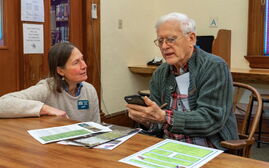
How to leverage broadband to build Maine's rural economies
Maine is known for its rugged coast, hardworking people and natural beauty. But beneath the charm lies a growing concern: How to replenish the oldest labor force in the country?

In places like Hancock County — home to Stonington, the state’s oldest town — more residents are aging out of the workforce than entering. And complicating things further, as the easternmost state in the U.S., Maine is quite literally at the end of the road.
For many of our rural communities and heritage industries, that isolation creates economic strain. Businesses struggle to find workers. Younger generations head out for more opportunities before considering coming home. Farms, fisheries and small-town retailers are forced to operate with smaller teams and fewer resources.
But something is changing. Maine is proving that with broadband access and the right tools, rural communities can adapt — and even thrive — in a digital age. So how can Maine’s rural businesses and heritage industries adapt in order to thrive?
Use technology to offset labor gaps
With fewer workers available in Maine, digital tools can pick up the slack. But they only help if small businesses are willing to adopt them. Tasks like booking appointments, managing inventory, and processing payroll no longer need to be done by hand. Today’s platforms can automate much of the back-office work to allow staff more opportunities to grow and adapt. Whether it's a single person running a general store or a lobsterman managing seasonal orders, technology allows small teams to stay productive and competitive.
Modernize, do not replace traditions
Maine’s heritage industries — fishing, farming, and logging — are foundational. But that doesn’t mean they need to operate like it’s still 1980. Farmers can now use drones to monitor crops and automate feeding systems. Fishermen can use remote sensors to track water temperature and salinity in real time—critical for sustainability. These tools reduce labor demands while also attracting younger, tech-savvy workers who want to bring innovation back to the land and sea. In fact, Maine is seeing a rise in new farms and young farmers—something almost unheard of in other parts of the country. Nearly 40% of Maine farmers are over 65. Many want to pass on their land and knowledge, but don’t know how. Technology can facilitate that generational handoff and longevity.
Sell to the world, not just the neighborhood
In small towns, foot traffic isn’t guaranteed. But the internet lets you bring your store to customers, wherever they are. Platforms like Shopify, Etsy, and even Facebook Shops make e-commerce accessible to anyone. Social media marketing tools keep your business top of mind and expand your reach to new audiences, far beyond Main Street. Digital gift cards, email newsletters, and loyalty apps extend customer relationships well beyond the summer tourist season. Tourists may only visit once a year, but the affinity they build for Maine, and your brand, can become portable and available if you use the right digital tools to ensure your storefront is available year-round.
Stay connected — from anywhere
Decades ago, many in Maine moved away in search of tech careers. Today, with broadband access spreading statewide, many are trying to come home. Remote jobs, virtual schools, and online communities make it easier than ever to live rurally and stay connected. Local business owners are using digital forums to trade advice, share resources, and even find successors for family-run businesses.
Model for the future
If small, remote towns like Stonington, Chebeague Island and Danforth can adapt and grow, others can too. By embracing broadband and digital tools, rural communities can build stronger economies, preserve their heritage, and create opportunities for the next generation. Technology won’t erase what makes Maine special. It will amplify it — our independence, resilience, and connection to place.
The road may end here in Maine, but the future economic success is just beginning.













0 Comments